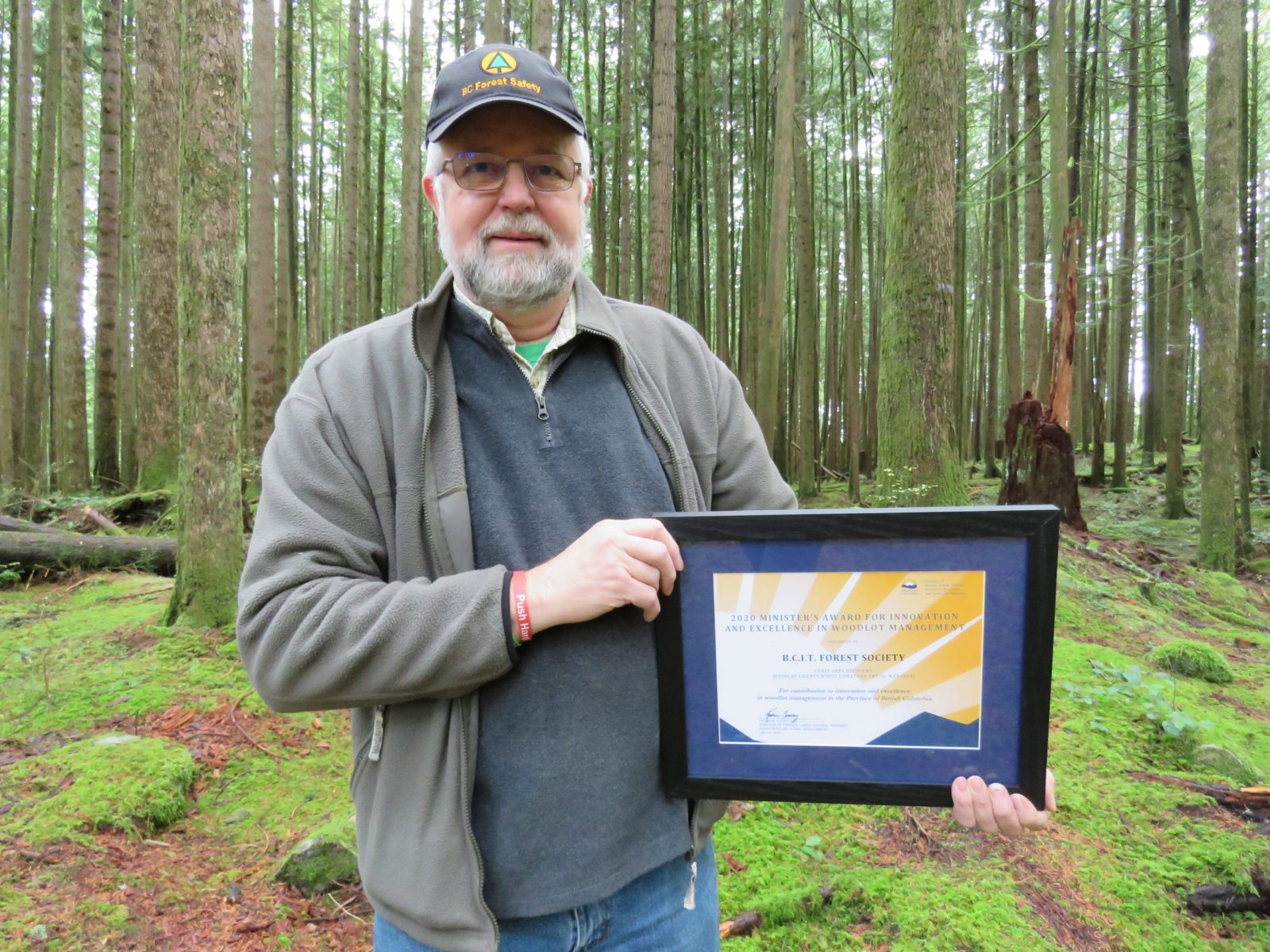Congratulations to the BCIT Forest Society (BCITFS), along with instructor Jonathan Smyth, on receiving the 2020 Minister’s Award for Innovation and Excellence in Woodlot Management for the Coast area.
Woodlot licensees are small scale forest managers which use sustainable long-term practices to harvest timber on Crown and private lands. They also have a duty to protect all forest values such as fisheries, wildlife, and water quality.
The award, which recognizes innovative woodlot licensees in three BC regions, was presented by Katrine Conroy, Minister of Forests, Lands, Natural Resource Operations and Rural Development. She commended the BCITFS, and Jonathan personally, for embracing new sustainable forestry practices, and developing future forestry leaders.
The BCIT Forest Society is a not-for-profit organization which operates Woodlot 0007 in Maple Ridge as an educational resource for students, as well as the surrounding community. Proceeds are used for bursaries and scholarships for Renewable Resource Program students; including Forest and Natural Area Management (FNAM); Fish, Wildlife and Recreation (FWR) and Ecological Restoration (ER). A new scholarship is being developed for Indigenous Students in these programs. Students are also hired for operation work as it comes available. Operations also help to maintain the training facility; a meet room (classroom), kitchen and dining space and an office.
Recognizing a true legacy in woodlot management
Jonathan, an instructor in the BCIT Forest and Natural Areas Management (FNAM) and Fish Wildlife and Recreation (FWR) programs, has been involved with the BCIT Forest Society for over 30 years, the last 16 as president. Although he has been recognized for his achievements in the past, he says it still feels overwhelming to be acknowledged with this award.
“It’s certainly very humbling,” says Jonathan. “I’m extremely honoured to be recognized by the Province in this respect. I’m really quite speechless about it.”
Jonathan, who is currently in his 34th year teaching at BCIT, says he is extremely proud of all staff, students, and community partners, who have contributed to Woodlot 0007 over the years.
He also says the award is an affirmation of the woodlot’s potential for educating others about sustainable forestry practices.
“I think it speaks to the overall intent of the woodlot, and its place in providing educational opportunities for our natural resource programs here in BC.”
SEE MORE: BCIT South Wetland Restoration project brings education to life
Hands-on learning for future forestry stewards
One of the goals of the BCITFS is to educate students about sustainable forest management, with the woodlot serving as an outdoor training facility. In fact, some of the teaching methods in the FNAM program could be used with younger learners as well.
“Our students learn to track the annual growth of trees in specific plots in the woodlot using tablets with georeferenced maps, but this can also be taught in elementary school, and we certainly like to encourage that sort of thing,” says Jonathan.
The site is predominantly used by BCIT students, although as Jonathan explains, many groups utilize the woodlot for educational purposes.
“Along with Scouts Canada, we host student groups from the local school district (SD42) and their Environmental School Project in Maple Ridge,” he says. “About 80 to 100 students visit the site twice a year, to learn about the different tree and wildlife species, and essentially their classroom is the outdoors.”
Jonathan adds that a second year FNAM project group is creating a signage plan for the woodlot including a segment of the Trans Canada Trail which runs through the woodlot, so that people can learn about the site as they hike along the trail.
Have you subscribed? Sign-up to receive the latest news on BCIT.
Maintaining strong community bonds
A crucial requirement of the BC Woodlot Licence Program is for licensees to provide employment and other opportunities for local communities, and to regularly consult with nearby land owners and interest groups, including First Nations.
The BCITFS coordinates with a number of Indigenous groups, including BCIT Indigenous Initiatives, and the Katzie and Kwantlen First Nations.
“We’ve had a good working relationship with the Katzie and Kwantlen First Nations for some time,” says Jonathan. “During harvest periods, we invite them out to for cedar bark stripping and gathering, and we’ve been doing this for the last seven or eight years.”
The BCITFS isn’t able to keep full-time employees since Woodlot 0007 is so small, but he says they do reach out to the local First Nations when they have planting and silvicultural operations for anyone who is interested.
Jonathan strongly believes in working closely with Indigenous groups, in order to achieve common goals and interests.
“I think moving forward it’s becoming increasingly important to develop the relationship with our Indigenous counterparts on the land base – it’s part of a new doing business culture.”
A career that makes a difference in the environment
With increasing urbanization, forests and natural areas in and around our communities are growing in importance. People value natural areas for recreation, aesthetics and psychological well-being. But natural areas also provide important ecological services, like habitat for wildlife, promotion of biodiversity, storm-water flood mitigation, and heat wave moderation.
The Forest and Natural Areas Management program is a two-year diploma with a focus on forestry, vegetation management, arboriculture for supporting sustainable community development in both rural and urban environments. Graduates are job-ready with strong skills in silviculture, forest inventory, forest engineering, fire and forest health management, and urban forestry. Employment opportunities are diverse and flexible, with the options to work outdoors, indoors, or a combination of both. Many graduates work for the municipal, regional, provincial and federal governments, the environmental consulting sector, and natural resource industry sectors in BC and beyond.
Learn more about the BCIT Forest and Natural Areas Management program.
